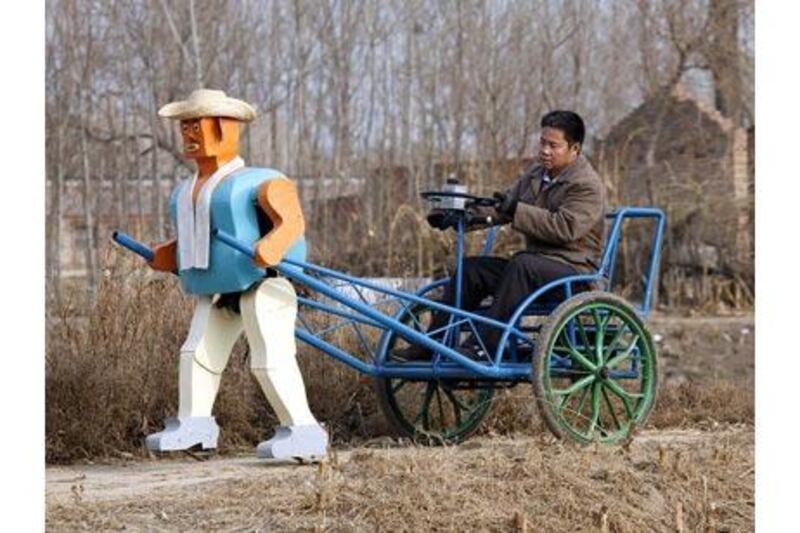BEIJING // A rickshaw pulled by a robot wearing a cowboy hat and sporting a dandy plastic moustache jerks into life and then clicks and whirrs its way across a component-strewn courtyard. For many years the man controlling the machine, Wu Yulu, was seen as the village idiot, a crackpot inventor of robots who would do anything to avoid the farm work he was supposed to do.
"This path has cost me a lot. At first everyone thought I was mad. I'm a farmer, I should do farm work," he says. But Mr Wu, 46, is having the last laugh. His amateur robotics earned him the title "China's Cleverest Farmer" on a popular TV show in 2004 and now the contracts are rolling in from companies keen to exploit his peculiar genius. China has long been the world's factory and its government is keen to encourage innovation to help develop its economy from that of a copycat industrial zone to one of an information technology and biotech powerhouse teeming with ideas. Mr Wu represents a small but vital cog in that process.
"Dajia hao [hello everybody]," a metallic voice says as the rickshaw driver lurches up and down. "I am a robot and my father is Mr Wu," the man-machine continues as it makes its way through the inventor's courtyard. The area is littered with automatons made out of scrap metal and what look like watch parts and dolls' heads to which Mr Wu adds liberal doses of genius and love. Arriving at his courtyard minutes earlier, we found the serious but amiable inventor working on a project he hopes will help people in hospital get in and out of their beds more easily.
We were directed to Mr Wu's house by his brother who lives down the street. For many years he was sceptical about the inventor's skills but recent successes and awards have earned the robot engineer new respect in his community. The highly respected Chinese Academy of Sciences has bought some of his work. Among the robots he has built are machines for making tea, for lighting cigarettes, even for playing the traditional Chinese erhu, a type of violin. He is now building a window-cleaning device for company based in the capital Beijing.
Once viewed as a bit of a madman, Mr Wu is now revered as a "teacher" by visiting university students from the city. His brother has even taken over the family's farming duties to allow Mr Wu to concentrate on his inventions. "I stuck with it and when I won my prize of 10,000 yuan (Dh5,376) they all changed their minds," Mr Wu says. "They realised I could make money with this." Mr Wu has made more than 30 robots, from one-legged ones to those with two, four and even 20 legs.
"Some can jump, some can clean windows and some can climb the walls. Every one is different," he says in a tone which could only be described as loving. Mr Wu's first inventions were much simpler than his latest creations and he just focused on making his machines walk in a straight line. His first contraption, which he built in 1986, resembled a walking watch cog. Climbing aboard one of his later walking machines - basically a car seat atop six robot legs - he says: "I do all of this just for fun. I only went to primary school, I have no education and I'm a farmer.
"I don't do ploughing work any more, my brother does it. I co-operate now with companies to make machines. I'm self-taught. This is my hobby." Pressing buttons, the machine lurches forward. It is hard to see a practical application for this robot, other than shaking the bones of unwitting travellers but it is fascinating nonetheless. "I have the power of imagination and ideas, even though my levels of education are low. My creative powers are stronger than those of many college students," Mr Wu says.
Many people visit him at his home which is in a village where everyone has the same surname. College students visit him to seek inspiration. "They call me laoshi (teacher). They want to learn skills," he says. In one of the studios off the courtyard is his latest piece, a mechanical light which will feature 20 moving figurines, all playing different musical instruments, attached to a revolving plate.
The corner of the room is decorated with the various awards and prizes he has won, including the Smartest Farmer award. "All my inventions are called 'Wu' and then a number. This is 'Wu 25'," he says, as a purple-haired robot, whose body looks like a petrol can, approaches. "And this is a finger machine," he says, switching on a long, jointed mechanical digit which jerks and beckons, beautifully but pointlessly. Then again, perhaps it is no less pointless than a glossy robot dog made by a giant Japanese electronics firm.
In fact, many of Mr Wu's robots exist solely to show different ways of walking. "This machine is straightforward, a fanning machine I made when I was wooing my wife. In hot weather it keeps her cool," says Mr Wu, as a four-legged machine begins to frantically wave a plastic fan, sending oil-scented air in my direction. The next mechanical marvel, "Wu 22", is a jumping robot which leaps like a Meccano gymnast. Its head is made from a ping-pong ball and gives it a sinister edge, making it look something like one of the evil mutant toys in the animated film Toy Story 2.
Indeed, Mr Wu's machines have inflicted injury on their creator. Over the years he has been treated in hospital several times after being hit by flying spare parts and his obsession with robots has alienated him from his children. But his wife, Dong Shuyan, has stood by him. As she climbs aboard the rickshaw for a jaunt across the courtyard, she says: "It's been hard to accept. But he's done good."
business@thenational.ae





